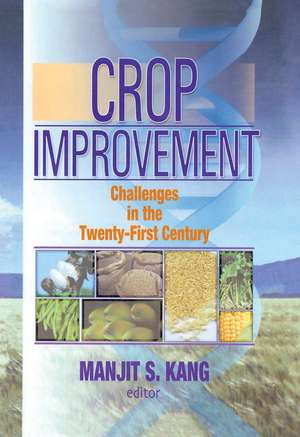Crop Improvement: Challenges in the Twenty-First Century
Autor Manjit S. Kangen Limba Engleză Hardback – 28 ian 2002
This comprehensive book provides the latest authoritative scientific information on improvement of both temperate and tropical crops. Crop Improvement: Challenges in the Twenty-First Century brings together expert plant breeders and geneticists to address issues related to crop adaptability and stability across environments for important food and fiber crops. It emphasizes the need to integrate molecular genetic techniques with traditional plant breeding methods to develop hardier, more productive crops.
Crop Improvement includes the latest research on physiological and biochemical responses of plants to drought and heat stress, which should help breeders develop effective strategies for improving resistance to abiotic stresses. In addition, this helpful book elucidates the use of mixed models and best linear unbiased prediction. To make the book comprehensive, chapters discuss stability analysis in crop performance trials and genotype-by-environment interactions.
Crop Improvement includes detailed information on breeding specific crops, including:
- rice
- tropical maize
- sorghum
- common bean
- sugar beet
- bananas and plantain
- cotton
Preț: 715.08 lei
Preț vechi: 955.88 lei
-25% Nou
Puncte Express: 1073
Preț estimativ în valută:
136.84€ • 142.06$ • 114.11£
136.84€ • 142.06$ • 114.11£
Carte tipărită la comandă
Livrare economică 22 martie-05 aprilie
Preluare comenzi: 021 569.72.76
Specificații
ISBN-13: 9781560229049
ISBN-10: 1560229047
Pagini: 408
Dimensiuni: 152 x 212 x 32 mm
Greutate: 0.82 kg
Ediția:1
Editura: CRC Press
Colecția CRC Press
Locul publicării:Boca Raton, United States
ISBN-10: 1560229047
Pagini: 408
Dimensiuni: 152 x 212 x 32 mm
Greutate: 0.82 kg
Ediția:1
Editura: CRC Press
Colecția CRC Press
Locul publicării:Boca Raton, United States
Public țintă
Academic, Postgraduate, and ProfessionalCuprins
Contents, About the Editor,, Contributors,, Foreword,, Preface,, Part I: Introduction--Vision,, Chapter 1. Crop Breeding in the Twenty-First Century,, Introduction,, Present Status,, Summary and Predictions,, Part II: Crop Improvement,, Chapter 2. Rice Improvement: Past, Present, and Future,, Introduction,, Post-Green Revolution Varieties,, Impact of Modern Varieties,, Future Challenges,, Conclusions,, Chapter 3. Tropical Maize: Innovative Approaches for Sustainable Productivity and Production Increases,, Introduction,, Tropical Maize-Growing Environments,, Challenges of Maize Improvement for the Tropics,, New Approaches and Research That Combine Conventional Breeding and Molecular and Biotechnological Tools,, Moving the Benefits of Maize Genetic Improvement to Farmers,, Conclusions: Tropical Maize Improvement Needs,, Chapter 4. Maize Improvement for Resistance to Aflatoxins: Progress and Challenges,, Introduction,, Contamination Process,, Reducing Aflatoxin Contamination in Maize,, Interrupting/Reducing Toxin Production Ability of the Fungus,, Concluding Remarks,, Chapter 5. Sorghum Improvement: Past Achievements and Future Prospects,, Introduction,, Sorghum Production, Production Areas, and Importance in the Global Food Systems,, Evolutionary Genetics and Germplasm Diversity in Sorghum,, History of Sorghum Improvement,, Breeding Tools,, Breeding Objectives and Achievements,, Current Progress in Biotechnology for Sorghum Improvement,, Challenges and Future Prospects,,
Descriere
This comprehensive book provides the latest authoritative scientific information on improvement of both temperate and tropical crops. Covering a range of essential food and fiber crops, Crop Improvement: Challenges in the Twenty-First Century addresses physiological and biochemical responses of plants to drought and heat stress, genotype-by-environment interactions, and use of best linear unbiased prediction. It also emphasizes the need to integrate molecular genetic techniques with traditional plant breeding methods to develop hardier, more productive crops.
To view an excerpt online, find the book in our QuickSearch catalog at www.HaworthPress.com.
To view an excerpt online, find the book in our QuickSearch catalog at www.HaworthPress.com.
